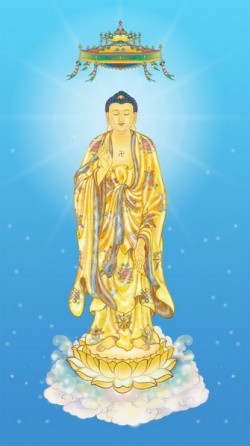Difference between revisions of "Fa-lang"
| Line 4: | Line 4: | ||
[[法朗]] (507–581) (PY [[Falang]]; Jpn [[Horo]]) | [[法朗]] (507–581) (PY [[Falang]]; Jpn [[Horo]]) | ||
| − | A priest of the [[Three Treatises]] | + | A [[priest]] of the [[Three Treatises]] [[Sanlun school]] in [[China]]. Since he lived at [[Hsing-huang-ssu]] [[temple]], he is also known as [[Hsing-huang]]. In 527 he renounced {{Wiki|secular}} [[life]] and studied [[meditation]] under [[Pao-chih]] at [[Ta-ming-ssu]] [[temple]]. |
| + | |||
| + | After that, he traveled and studied the [[vinaya]], or {{Wiki|rules}} of [[monastic]] [[discipline]], and the teachings of the [[Abhidharma]] ([[P'i-t'an]]) and the [[Establishment of Truth]] ([[Ch'eng-shih]]) schools. At [[Chih-kuan-ssu]] [[temple]], he studied The [[Treatise on the Great Perfection of Wisdom]], The [[Treatise on the Middle Way]], The [[One-Hundred-Verse Treatise]], and The [[Treatise on the Twelve Gates]] under [[Seng-ch'yan]]. He also studied the [[Flower Garland]] and [[Wisdom sutras]]. He was revered as one of [[Seng-ch'yan's]] four main [[disciples]]. In 558, in compliance with {{Wiki|imperial}} decree, he settled at [[Hsing-huang-ssu]] [[temple]] in the {{Wiki|capital}} and lectured on the above [[four treatises]]. [[Chi-tsang]] was his successor. | ||
</poem> | </poem> | ||
{{R}} | {{R}} | ||
Latest revision as of 07:02, 5 February 2015
Fa-lang
法朗 (507–581) (PY Falang; Jpn Horo)
A priest of the Three Treatises Sanlun school in China. Since he lived at Hsing-huang-ssu temple, he is also known as Hsing-huang. In 527 he renounced secular life and studied meditation under Pao-chih at Ta-ming-ssu temple.
After that, he traveled and studied the vinaya, or rules of monastic discipline, and the teachings of the Abhidharma (P'i-t'an) and the Establishment of Truth (Ch'eng-shih) schools. At Chih-kuan-ssu temple, he studied The Treatise on the Great Perfection of Wisdom, The Treatise on the Middle Way, The One-Hundred-Verse Treatise, and The Treatise on the Twelve Gates under Seng-ch'yan. He also studied the Flower Garland and Wisdom sutras. He was revered as one of Seng-ch'yan's four main disciples. In 558, in compliance with imperial decree, he settled at Hsing-huang-ssu temple in the capital and lectured on the above four treatises. Chi-tsang was his successor.
